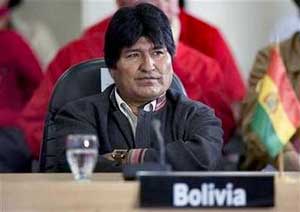Evo Morales ends hunger strike with victory
By
Lal Roohk
Published Apr 19, 2009 9:35 PM
Bolivian President Evo Morales is scheduled to speak at the Salem United
Methodist Church in Harlem when he visits the U.N. in New York on April 22. On
April 14, Morales and his supporters ended a five-day hunger strike in victory
after Bolivia’s congress passed a law guaranteeing 14 congressional seats
for Indigenous candidates and allowing expatriates the right to vote.
|
Bolivian President Evo Morales
|
On April 9, Morales and his allies in the Indigenous and workers’
movements called a hunger strike to demand the implementation of an electoral
law guaranteeing general elections next Dec. 6 and regional polls in April
2010. The opposition in the Senate had been sabotaging the new Bolivian
Constitution and the electoral process for months in order to stop the
election, which is expected to further their defeat.
Indigenous and labor leaders joined with Morales and together they declared the
hunger strike from the presidential palace. Responding to this action,
representatives of the mass organizations had been continuing to arrive at
Murillo Square in front of the palace. By April 11, an estimated 1,500 had
joined the hunger strike defending the right to vote.
The Provisional Electoral Law and the new Bolivian Constitution insure the
voting rights of workers and Indigenous people. The Senate minority tried to
sabotage the constitution and the elections, because as Morales says, “It
will be impossible to beat them [the Indigenous] at the polls.”
(www.boliviaUN.org) The minority had been attempting to reduce the number of
Indigenous seats from 14 to four in the new Plurinational Assembly (the name
the Congress will adopt in 2010).
Opposition to his government is based in a small wealthy class that controls
the fertile land in the eastern lowlands of Bolivia, where they have horribly
exploited the Indigenous population. Last September they killed 11 people and
wounded 50 more in an attempt to secede from the poorer, arid western
highlands.
The failure of his rich opponents has increased Morales’ prestige and
moral authority. He is standing up to oligarchs who are backed by U.S.
financial and military aid. More than once in the past year he has expelled
U.S. Embassy officials for their seditious actions. In the arena of this
struggle the success of the Morales government in improving health care,
education and the distribution of wealth has not remained hidden. This is
despite the fact that the oligarchs virtually control the entire media.
Important changes have been taking place in Bolivia. “An exemplary
literacy campaign has eliminated illiteracy in record time; medical services
now extend to the entire population; and important historical needs of the
Bolivian people are being addressed with original and new methods. The economy
and hard currency reserves are growing. This infuriates the oligarchy.
“The new constitution of Bolivia guarantees universal access to quality
public education that is community-based as well as intercultural and
plurilingual. Three new Indigenous universities to be opened, each located in a
different region of Bolivia, will offer instruction in the native languages of
Aymara, Quechua, and Guaraní.” (BoliviaUN.org, April 7)
On March 20, Pablo Solon, Bolivian ambassador to the U.N., announced at a
meeting of labor and community activists held at SEIU 1199 in New York that
Morales plans to visit New York. Solon said that President Morales will raise
issues at the U.N. that he is working on, including the implementation of a
“Mother Earth Day.”
Morales wants to build a wide network of labor, community and youth
organizations that are concerned with the urgency of the environmental damage
caused by major capitalist powers. Solon talked about the acute problems of
underdeveloped countries that have been stripped of the means to recover. In
Bolivia and other Andean countries the rapid melting of glacier water is
endangering the water supply.
Speaking of the G20 summit, Morales said: “As long as we do not touch the
structural points of capitalism, it will be difficult to resolve the financial
crisis. If we want to solve economic problems, we must first end the free
market, then the speculative capitalism.” (www.boliviaUN.org)
Cuban leader Fidel Castro had been following the course of the hunger strike
with frequent calls to the Cuban ambassador in La Paz. Castro reported on April
10, “Evo Morales is well, and in constant communication with his cadres
on cell phone. People continue arriving at Murillo Square. I haven’t the
slightest doubt that Evo will come out victorious,” said Castro. (Prensa
Latina)
Articles copyright 1995-2012 Workers World.
Verbatim copying and distribution of this entire article is permitted in any medium without royalty provided this notice is preserved.
Workers World, 55 W. 17 St., NY, NY 10011
Email:
[email protected]
Subscribe
[email protected]
Support independent news
DONATE


